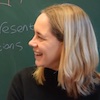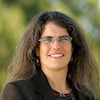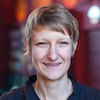Happy International Women's Day 2021!
To celebrate this year's International Women's Day on March 8, 2021, we revisit some of the articles, podcasts and videos we have produced with female mathematicians over the last year. From the mathematics of shuffling to tackling the COVID-19 pandemic, we've really enjoyed speaking to all of them about their work.
On the mathematical frontline — Over the last year Julia Gog's life as a mathematician has drastically changed as she has been working full time on the COVID-19 pandemic, advising the government through her roles on SAGE and SPI-M, and founding the JUNIPER modelling consortium.
We've been fortunate to work closely with her over the last year writing many articles on her work, which you you can find here). You can hear her talk about how different her life has been this year in our recent podcast.

New perspectives in symmetry — Colva Roney-Dougal was one of the organisers of an international research programme at the Isaac Newton Institute. In this article she and her co-organiser, Martin Liebeck, talk about group theory and why it is such an exciting area of mathematics.

Testing testing in schools — Louise Dyson is one of the researchers from the JUNIPER consortium exploring the question: what is the safest way to reopen schools? The model developed by Dyson and her colleagues compares different COVID testing strategies in secondary schools, with interesting results about their benefits and drawbacks.

The mathematics of shuffling — In this article, and accompanying podcast, Cheryl Praeger takes us on a fascinating journey through the maths of card shuffling, and gives us a great insight into how mathematicians work.

Careful with your Christmas b(a)ubbles — Another JUNIPER researcher, Ellen Brooks Pollock is part of the team modelling household bubbling and how this could make a real difference to the spread of COVID-19, particularly over Christmas.

Universe Unravelled — We're very proud of the documentary series we worked on together with the Discovery Channel and the Stephen Hawking Centre for Theoretical Cosmology in Cambridge. It was a great pleasure working with all the brilliant researchers, including Francesca Chadha-Day, Amelia Drew, Felicity Eperon, Debora Sijacki and Cora Uhlemann.
Dynamic numbers — Holly Krieger won one of last year's Whitehead Prizes for work that combines arithmetic and dynamical systems, and leads to beautiful fractal shapes like the Mandelbrot set.
Taming complexity — Maria Bruna was another winner of a Whitehead Prize, recognised for finding a systematic way of simplifying complex systems. Her methods not only work in biology and medicine, but have also helped the company Dyson improve their vacuum cleaners.

Black holes win Nobel Prize — Andrea Ghez was one of the three winners of the 2020 Nobel Prize in Physics for their work on black holes.
Talking to young researchers — It was a pleasure to talk to Yasmeen George, one of the young researchers attending the Virtual Heidelberg Laureate Forum, about her work using machine learning to help diagnose disease from medical images.

Going back to uni during a pandemic — Rebecca Hoyle was one of the contributors to the Infectious Dynamics of Pandemics programme at the Isaac Newton Institute. We spoke to her and fellow contributor, Ellen Brooks Pollock, about what maths can tell us about how to make universities safe from COVID-19.

Understanding information — Information is supremely powerful, yet it can't be described by traditional physics. In this series of articles and an accompanying podcast, Chiara Marletto helped us understand how constructor theory may be able to help.

Artificial intelligence takes on COVID-19 — Mathematician Carola-Bibiane Schönlieb is working with radiologist Evis Sala to develop an AI tool to help with diagnosing COVID-19 and making prognoses for infected patients.